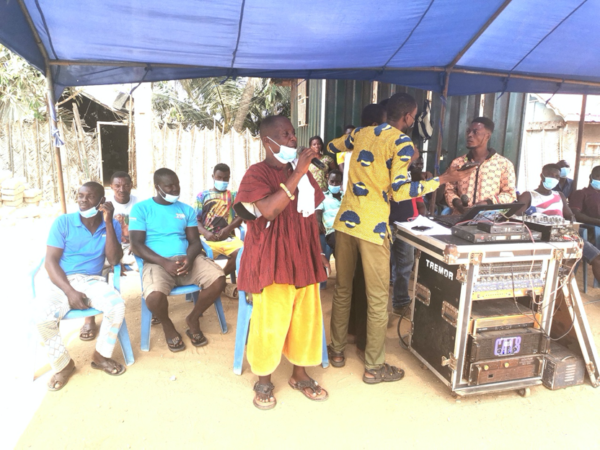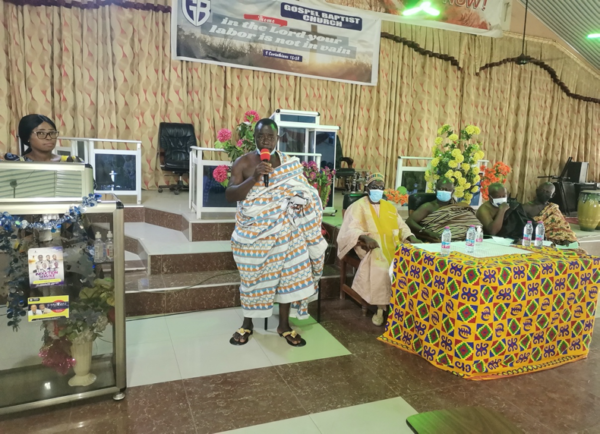Azizanya and Kewunor are two communities in the Ada East District of the Greater Accra Region locked between the Gulf of Guinea and the Volta River.
It should be a blessing; instead, the residents say there is more to worry about being peninsula communities.
At a Town Hall Meeting in Azizanya on Monday, February 21, 2022, residents said tidal wave invasion, politicisation of premix fuel, fishing with light, alleged attempt by the government to hand over their land to a private real estate company are key concerns in their communities.
Setting the tone for the meeting, the Chief Fisherman for the two communities, Nene Tei Otibo, said the premix fuel (a subsidised petroleum product used to power their outboard motors for artisanal and marine fishing) has become scarce. The distribution of the little available is also being politicised.
“We are not receiving enough premix fuel for our work. Interestingly, people who are not fishermen in our communities are getting them. It is worrying and undermining our work,” he said to cheers.

With rising tidal waves shrinking their land, an emotional Martha Obodai, said the government’s failure to complete the sea defence wall in the area had aggravated their situation as they had to endure months of flooding. This kept their children at home during school hours, she added.
Although light fishing is illegal in Ghana, a septuagenarian, Samuel Adjove, claimed the lax enforcement of the law had made it easy for fishers from other regions to invade Azizanya’s territorial waters.
“We’re adhering to the law because we know its benefits for our community but there are some recalcitrant people who don’t care. They have destroyed the sea in their communities and are now here fishing with light. The government must do something about it,” he added.
But for Gabriel Aklie, the possibility of losing their lands to a real estate developer is brewing tension.
“If the government is not ready to help us, but want to steal our lands, then they should leave us alone to manage our situation,” he advised.
In Ejura in the Ejura Sekyedumase Municipality, Nana Kwadwo Ansah Ansebia II, Nifahene and Chief of Babaso community is bemoaning the lack of accountability from the Municipal Assembly over the collection of market tolls, particularly from the Ejura market.
According to him, the Ejura market is the biggest in the municipality and rakes in lots of revenue. Unfortunately, there is no proper account from the Assembly, stalling infrastructural developments in the market. At the moment, the market does not have proper public toilets, market sheds, drainage systems among others, needed to facilitate smooth operation of business.
“Please, permit me to ask this question; is the Ejura market for the entire Ejuraman or it is for some selected few? Why can’t we know how much is collected? What are our monies being used for and why can’t we build the market?” he asked.

In the Sagnarigu Municipality, the people of Taha and Gbalahi are unhappy at the total neglect by the Municipal Assembly and Government of their development needs. According to them, the only Community-based Health Planning Services (CHPS) compound serving Taha and Gbalahi communities lack medical supplies. The facility according to the community folks does not have adequate hospital supplies. Patients are sometimes forced to go out to nearby towns and cities to get their own medical supplies for treatment. This situation, according to them, has aggravated their lack of access to quality healthcare.
Bringing governance to the doorsteps of people requires strategies and interventions suitably adapted to particular local contexts.
At the MFWA, the strategy is to partner two important institutions within the local setting for such engagements. The Metropolitan Municipal and District Assemblies (MMDAs), being government representation at the local level; and community radio, being a relevant source of information for the locals. Platforms such as Town hall meetings and radio discussions are used to facilitate citizens-authorities dialogues. The MMDAs play essential roles by availing themselves for such public engagements while the community radios broadcast the meetings live to the wider population. These platforms empower citizens to exercise their right to information by seeking updates on the state of infrastructure development and delivery of social services in the district, and at the same time, expressing their views and concerns.
These town hall meetings form part of the MFWA’s project on Enhancing citizens access to information and participation in governance with funding support from the DW Akademie based in Germany.





